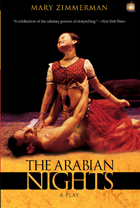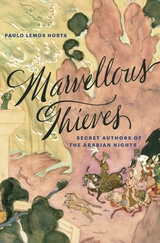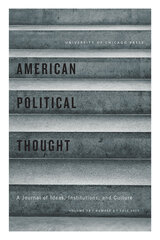

Although many of its stories originated centuries ago in the Middle East, the Arabian Nights is regarded as a classic of world literature by virtue of the seminal French and English translations produced in the eighteenth and nineteenth centuries. Supporting the suspicion that the story collection is more Parisian than Persian, some of its most famous tales, including the stories of Aladdin and Ali Baba, appear nowhere in the original sources. Yet as befits a world where magic lamps may conceal a jinni and fabulous treasures lie just beyond secret doors, the truth of the Arabian Nights is richer than standard criticism suggests.
“Marvellous Thieves, which draws on hitherto neglected sources, is a brilliant, fluent and original work of literary scholarship.”
—Robert Irwin, Literary Review
“This fine book…cogently probes an influential period in the knotted and at times sordid history of the Arabian Nights, serving as a fine example to those unraveling this promiscuous and forever malleable set of stories.”
—Charles Shafaieh, Wall Street Journal
“Intelligent and engrossing…The great merit of Horta’s book is that its interest always lies in the story of the story, in mapping out the complex network of the translators, editors and travellers behind the Arabian Nights, in ways that enrich our sense of this remarkable text.”
—Shahidha Bari, Times Higher Education

Our foremost theorist of myth, fairytales, and folktales explores the magical realm of the imagination where carpets fly, objects speak, dreams reveal hidden truths, and genies grant prophetic wishes. Stranger Magic examines the wondrous tales of the Arabian Nights, their profound impact on the West, and the progressive exoticization of magic since the eighteenth century, when the first European translations appeared.
The Nights seized European readers' imaginations during the siècle des Lumières, inspiring imitations, spoofs, turqueries, extravaganzas, pantomimes, and mauresque tastes in dress and furniture. Writers from Voltaire to Goethe to Borges, filmmakers from Raoul Walsh on, and countless authors of children's books have adapted its stories. What gives these tales their enduring power to bring pleasure to readers and audiences? Their appeal, Marina Warner suggests, lies in how the stories' magic stimulates the creative activity of the imagination. Their popularity during the Enlightenment was no accident: dreams, projections, and fantasies are essential to making the leap beyond the frontiers of accepted knowledge into new scientific and literary spheres. The magical tradition, so long disavowed by Western rationality, underlies modernity's most characteristic developments, including the charmed states of brand-name luxury goods, paper money, and psychoanalytic dream interpretation.
In Warner's hands, the Nights reveal the underappreciated cultural exchanges between East and West, Islam and Christianity, and cast light on the magical underpinnings of contemporary experience, where mythical principles, as distinct from religious belief, enjoy growing acceptance. These tales meet the need for enchantment, in the safe guise of oriental costume.
READERS
Browse our collection.
PUBLISHERS
See BiblioVault's publisher services.
STUDENT SERVICES
Files for college accessibility offices.
UChicago Accessibility Resources
home | accessibility | search | about | contact us
BiblioVault ® 2001 - 2025
The University of Chicago Press









